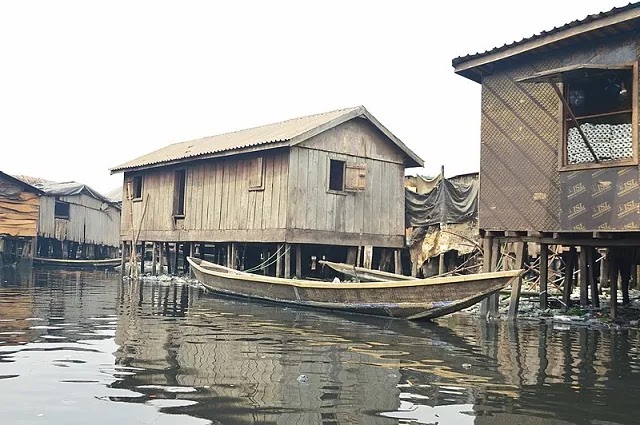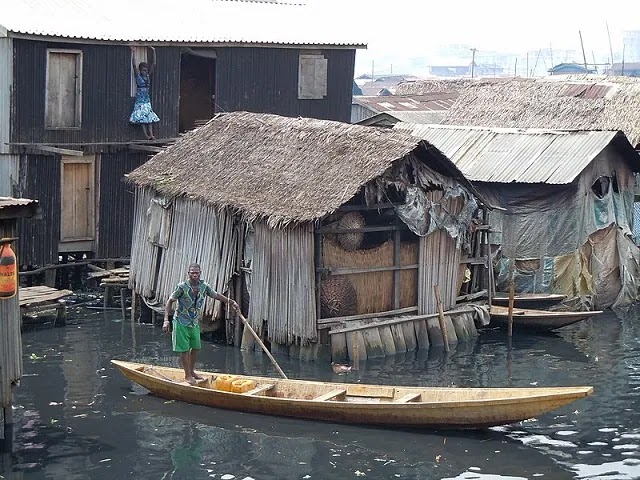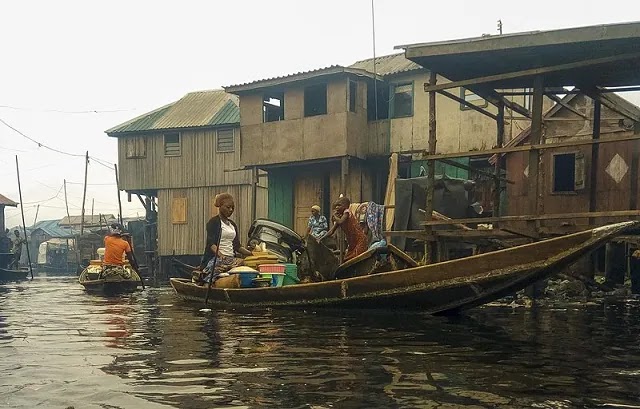Let’s think of large floating cities on water. You are the resident. You are in a hurry to go to work. You got out of the house and hired a taxi. After a while, you saw the road become submerged in heavy rain.
Dirty water started entering the back seat of your taxi at high speed. Or think of a town where the inhabitants remain above the water. They need a boat to go to the house of their neighbor.
They also need it to send children to school or buy daily necessities. The boat is a necessary medium of connection in their life. But, these two scenarios above exist in the heart of the earth.
What kind of life is there? Do people study? How does the wheel of daily life rotate in this town? How are people adapting to such a predicament?
Read their stories below to find the answers. Lagos is the most populous city in Africa. The city is also in the most vulnerable position climate.

With a population of 24 million, this region is the economic driving force of Nigeria. And that is why people from different parts of the country gather and stay in search of work.
The roads of Lagos are impassable and environmental pollution is on the rise. It is happening because of being unable to cope with the growing population.
The inefficient drainage system of Lagos as an urban area is the biggest flaw. This almost unmanaged process generates an average of 8,000-10,000 tons of waste.
The city faces floods in the light rains for the lack of proper management of this amount of waste. The piles of rubbish remain scattered here and there and then merge with the rainwater.
It is almost impossible for pedestrians to walk or drive. The shipping system in Macaco is the most popular. There is another major cause of misery in Lagos, which is the rising sea level.
If global temperatures rise by two degrees Celsius, Lagos will face a big problem. It will see a 90-centimeter rise in sea level by 2100. Is Nigeria trying to survive this disaster? We have the interest to know about this.
Floating installation
Makoko is a watershed area of Lagos, which many people know as the Venice of Africa. This maze-like area is a slum. The location of this slum is on water. The canoe is the only way to get from one place to another.
It would be hard to imagine, but it is the harsh reality of Makoko. The people of this region are in dire need of both adequate electricity.
They also need a healthy sewerage system. The region of Lagos is home to some of the most intriguing architectural styles.
Makoko Floating School is one of them. Many of these schools in Makoko have designs like pyramids. The top side is narrow and angular. The bottom side is a flat deck.
Several recyclable plastic drums remain under the deck. The whole installation floats on these drums.
It does not have any construction of the traditional square shape on the water. Why did the designers take inspiration from the pyramid for the design?

The elements of the installation are lighter than something built in the shape of a pyramid. The center of gravity is also low. Residents of this city on water use canoes as their transportation system.
With these two advantages in mind, Pyramid architecture has already attracted worldwide attention. African Floating cities on the water can be a great matter of interest, though it has many problems.
How would floating cities be damaging to the environment? Floating cities on the water can be so damaging to the environment.
It can destroy the ecosystem of its adjacent water. Makoko is one of the largest floating cities on the water.
Coastal tolerance
This city in Nigeria faces flood. The initial initiative to provide flood forecasting was on one-sided reliance on newspapers. Magazines, television, and radio were also the medium of flood forecasting. Residents in floating cities on water remain prepared to face any disaster.
At one point, the administration realized it was impossible to take effective action. Administrations rely on these things to give forecasts. People learn about the flood from these mediums, but it becomes too late.
They don’t get the time that they need to store dry food. They fail to pack daily necessities. They also fail to move to shelters. These radios and magazines can’t predict floods well in advance.
The Ministry of Agriculture of Nigeria created the WetIn app for flood effects. This app can predict floods much earlier than conventional media. It is commendable as an initial initiative.
But, the main limitation was its creation for farmers only. The app targets the farmers in the federation’s three main flood-prone areas. It can issue warnings four days before any possible disaster.
Something more fulfilling was necessary, as a class of members benefited from the app. The Nigerian Federal Authority is playing a leading role in this step.
They created an app called Flood Mobile App. One of the salient features of this app is that it can predict in advance. In this way, the inhabitants of the coastal region get time to make preparations.

The app is well-liked by everyone because it can act as a real-time update system for forecasting. It means it can update every moment for a specific location. Residents in floating cities on water earn their livelihood by catching fish.
The app uses the information it collects from the Nigerian Hydrological Services Agency. The people living in these floating cities on water understand the difficulties.
The specialized use of ferries
Due to the heavy rains, the road communication system in Lagos is in a bad state. More than 40 ferry routes and 30 commercial jetties and terminals are usually here. These are usable for passenger transport.
This active shipping system seems to be a source of comfort. Good time becomes wasted due to unplanned and fragile roads and indescribable misery.
The people who live here understand how difficult for them to live in such an environment. Apart from time, there is another striking aspect of the shipping system.
That is its environmental impact. A ferry is more friendly than a bus or a taxi when calculating the number of carbon emissions per passenger. Ferries emit less carbon than buses and taxis.